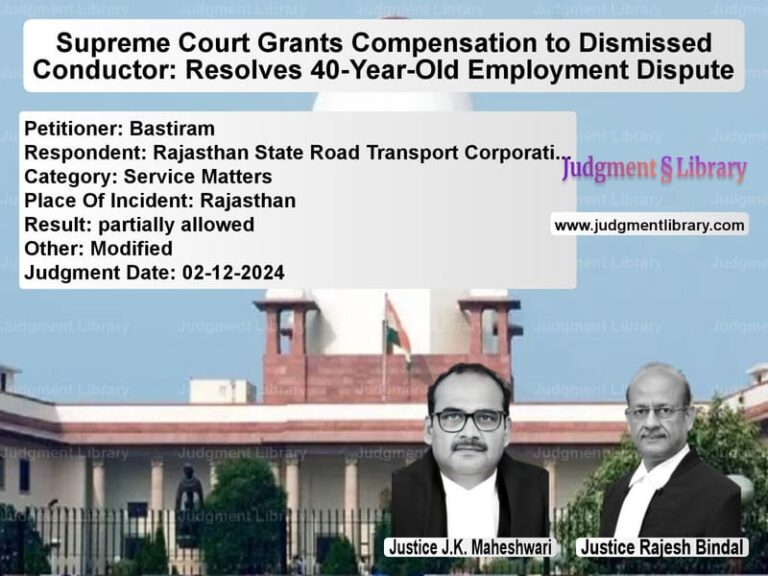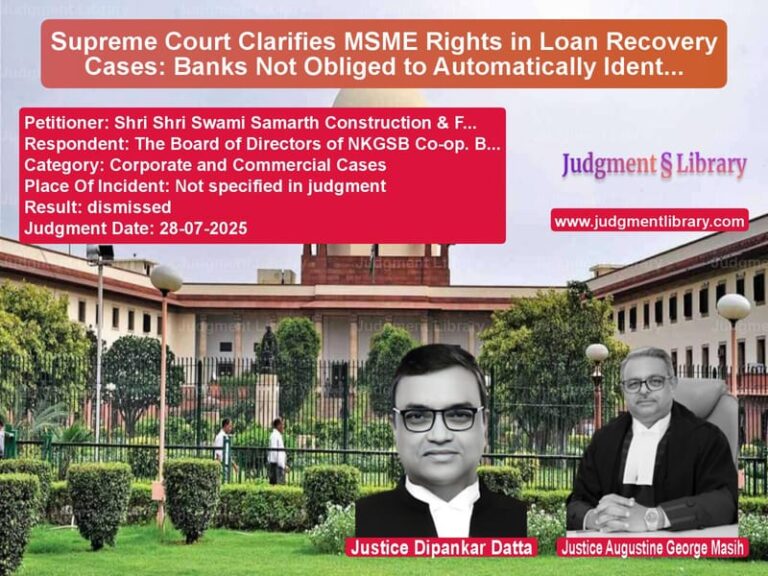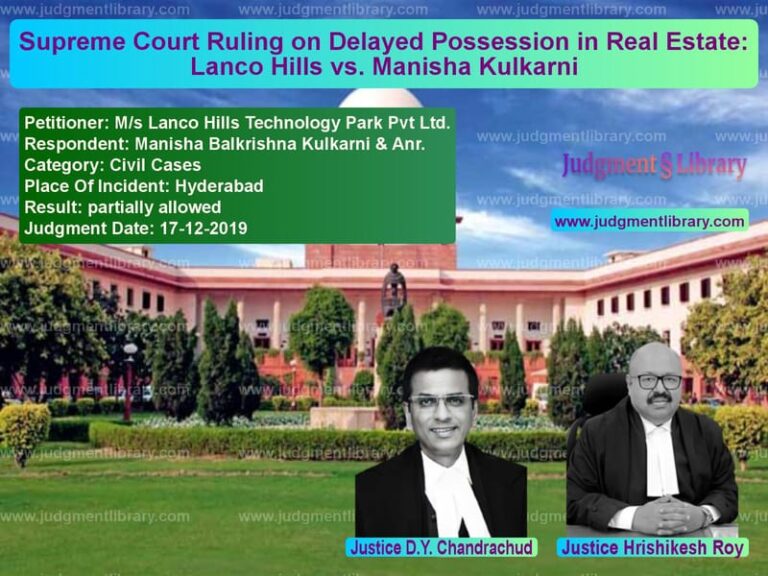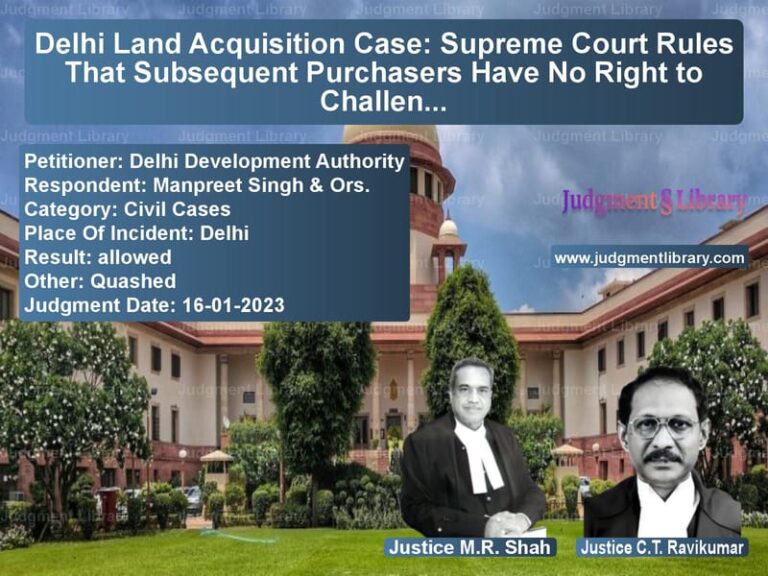Supreme Court Rejects Regularization of Casual Workers in BRO: High Court’s Mandamus Overturned
The case of Union of India & Ors. v. All India Trade Union Congress & Ors. revolves around the demand for regularization of casual workers employed in the Border Roads Organization (BRO). The Supreme Court, in its judgment dated March 15, 2019, set aside the Uttarakhand High Court’s decision, ruling that courts cannot create employment schemes or mandate regularization through judicial orders.
This case serves as an important precedent on labor rights, judicial intervention, and the government’s role in employment policy.
Case Background
The case originated from a writ petition filed by the All India Trade Union Congress (AITUC) and GREF Mazdoor Kalyan Sangathan, representing casual workers employed in BRO. The petitioners sought the following reliefs:
- Regularization of casual workers who had worked for more than five years.
- Equal benefits and pay as enjoyed by permanent Group ‘D’ employees.
- Implementation of labor laws, including EPF, gratuity, bonus, and compensation.
- Facilities such as warm clothing, proper housing, maternity leave, and healthcare.
The Uttarakhand High Court ruled in favor of the workers and issued multiple directions, including:
- Formulation of a regularization scheme within three months.
- Implementation of minimum wage laws and pay parity with regular employees.
- Granting of temporary status to workers completing 240 days of continuous work.
- Providing warm clothing and housing in extreme weather conditions.
- Opening crèches for workers’ children and ensuring free medical care in military hospitals.
Aggrieved by the decision, the Union of India challenged the High Court’s ruling before the Supreme Court.
Petitioner’s Arguments
The Union of India, represented by Senior Advocate Ajit K. Sinha, argued:
- The High Court exceeded its jurisdiction by creating an employment scheme.
- Regularization was not permissible as per the Supreme Court’s ruling in State of Karnataka v. Umadevi (2006).
- Casual employment in BRO was project-based and subject to termination upon project completion.
- The High Court’s directions imposed financial and administrative burdens on the government.
Respondent’s Arguments
The workers’ unions, represented by Senior Advocate Colin Gonsalves, contended:
- The workers had been employed for decades and deserved regularization.
- The government was exploiting casual workers by denying them statutory benefits.
- The High Court had merely ensured compliance with constitutional guarantees of equal pay and dignity at work.
- Labor rights must be protected, especially for workers engaged in dangerous conditions in border areas.
Supreme Court’s Observations and Ruling
The Supreme Court ruled in favor of the Union of India, holding that the High Court had overstepped its authority.
“It is not the function of the courts to frame employment schemes. That is the prerogative of the executive.”
Regarding regularization, the Court referred to its earlier ruling in Union of India v. Vartak Labour Union (2011):
“Casual employment terminates upon discontinuation of work. Mere long-term engagement does not create a right to regularization.”
The Court also held that courts cannot impose administrative decisions on the government:
“The High Court’s directive to frame a regularization scheme was beyond judicial review. Such matters fall within the exclusive domain of the government.”
However, the Supreme Court acknowledged the workers’ hardships and noted that:
“The government has framed welfare schemes addressing the concerns raised by the workers. Such schemes should be periodically reviewed and updated.”
Consequently, the Supreme Court:
- Set aside the High Court’s ruling.
- Declared that casual workers do not have an automatic right to regularization.
- Directed the government to continue implementing its existing welfare schemes.
Conclusion
This judgment clarifies the legal position on casual employment in government projects. The key takeaways are:
- Regularization cannot be granted by courts; it is a policy decision of the executive.
- Casual workers cannot claim permanent employment solely based on long-term engagement.
- Governments must implement and review welfare schemes for project-based workers.
- Judicial activism must be exercised within constitutional limits, respecting the separation of powers.
By overturning the High Court’s decision, the Supreme Court reaffirmed the principle that employment policies must be decided by the legislature and executive, not the judiciary.
Petitioner Name: Union of India & Ors..Respondent Name: All India Trade Union Congress & Ors..Judgment By: Justice Abhay Manohar Sapre, Justice Dinesh Maheshwari.Place Of Incident: Uttarakhand.Judgment Date: 15-03-2019.
Don’t miss out on the full details! Download the complete judgment in PDF format below and gain valuable insights instantly!
Download Judgment: Union of India & Ors vs All India Trade Unio Supreme Court of India Judgment Dated 15-03-2019.pdf
Direct Downlaod Judgment: Direct downlaod this Judgment
See all petitions in Employment Disputes
See all petitions in Recruitment Policies
See all petitions in Public Sector Employees
See all petitions in Judgment by Abhay Manohar Sapre
See all petitions in Judgment by Dinesh Maheshwari
See all petitions in allowed
See all petitions in Quashed
See all petitions in supreme court of India judgments March 2019
See all petitions in 2019 judgments
See all posts in Service Matters Category
See all allowed petitions in Service Matters Category
See all Dismissed petitions in Service Matters Category
See all partially allowed petitions in Service Matters Category







